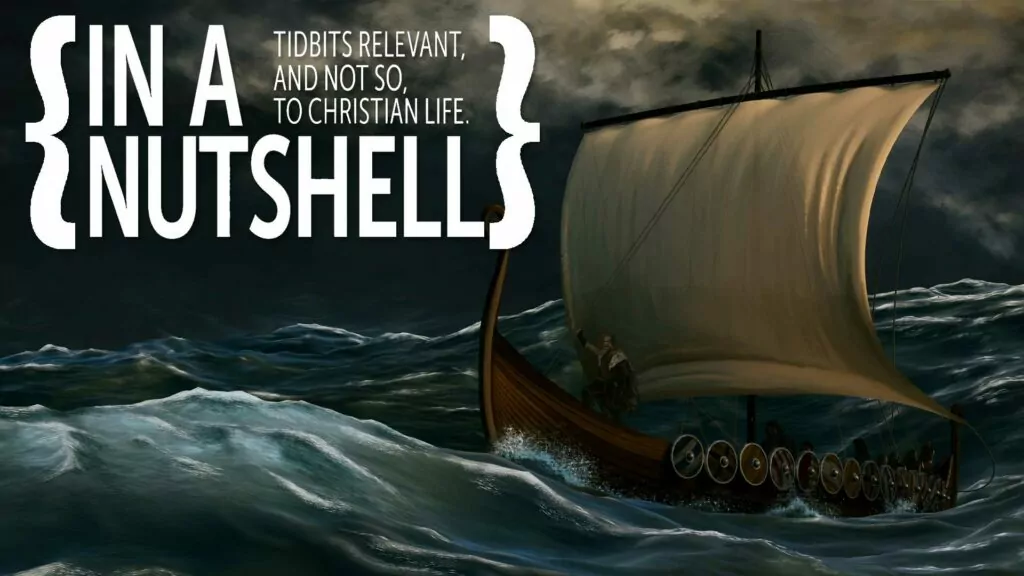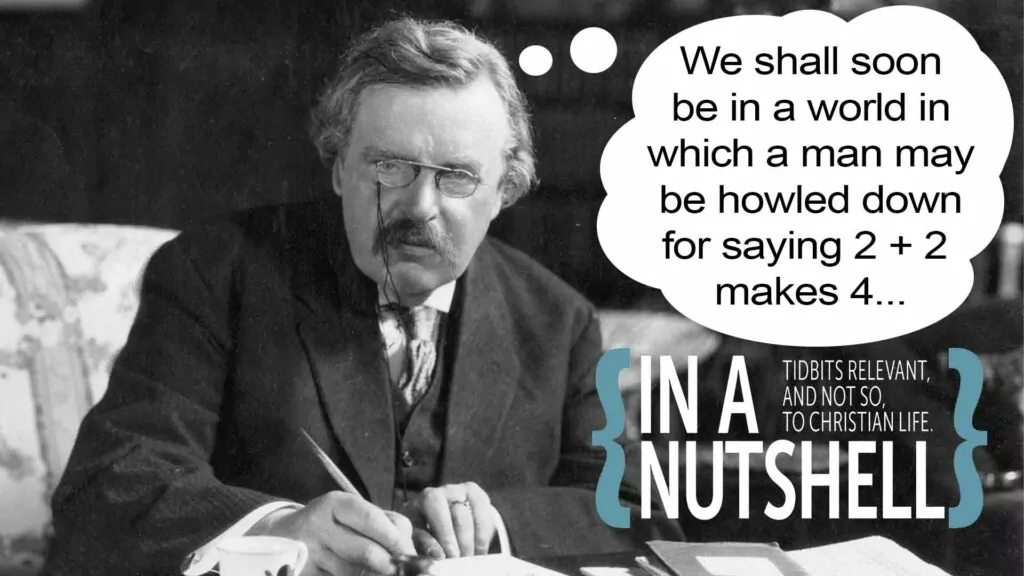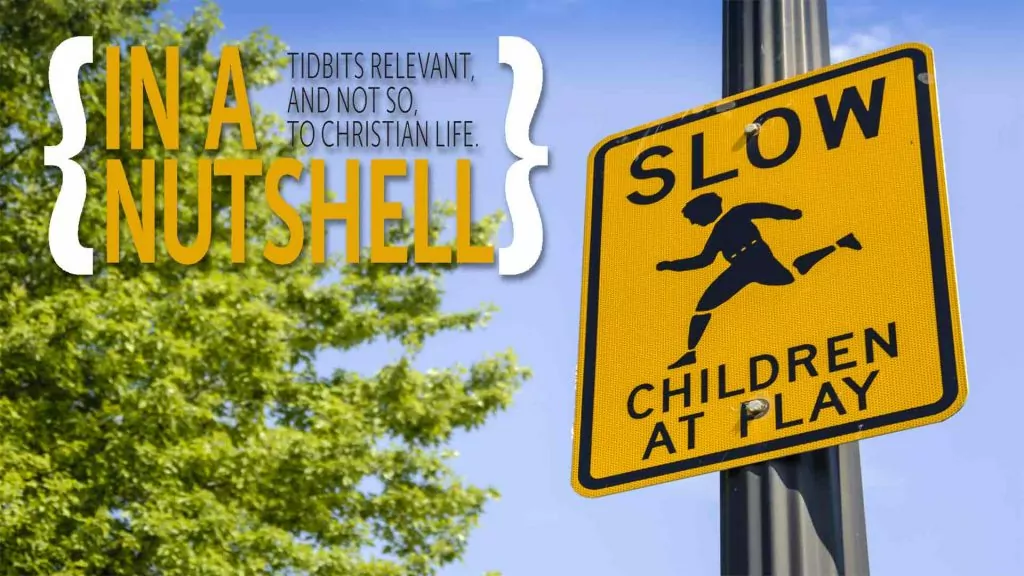
In a Nutshell
Tidbits – December 2023
“You better watch out!”
It’s nearing that time of year again, when you might hear the chorus of a familiar Bing Crosby hit. I always thought it sounds a bit like he was talking about God (he's not). My friend's thinking went in a completely different direction, and he wrote his own ending...
He knows when you've been sleeping
He knows when you're awake
He knows if you've been bad or good,
We're in a surveillance state!
Next issue for the Supreme Court?
Despite dying over a hundred years ago poet William Cosmo Monkhouse (1840-1901) has his finger on the pulse of today’s culture.
There once was an old man of Lyme
Who married three wives at a time.
When asked, “Why a third?”
He replied, “One’s absurd!
And bigamy, sir, is a crime.”
Lyrics o’ the month
In his song Screen Door, Rich Mullins seemed to be working through James 2:14-26, (and Matthew 7:15-20, Galatians 5:6, Hebrews 6:10, etc.).
It's about as useless as a screen door on a submarine
Faith without works baby, it just ain't happening
One is your left hand, one is your right
It'll take two strong arms to hold on tight
Some folks cut off their nose, just to spite their face
I think you need some works to show for your alleged faith
Well there's a difference you know
'Tween having faith and playing make believe
One will make you grow, the other one just make you sleep
Talk about it but I really think you oughta
Take a leap off of the ship before you claim to walk on water
Faith without works is like a song you can't sing
It's about as useless as a screen door on a submarine
Faith comes from God and every word that He breathes
He lets you take it to your heart, so you can give it hands and feet
It's gotta be active if it's gonna be alive
You gotta put it into practice, otherwise…
Faith without works is like a song you can't sing
It's about as useless as a screen door on a submarine
 T-shirt Christianity. the best kind
T-shirt Christianity. the best kind
Abort73.com sells shirt to direct people to their website, which offers up compelling and comprehensive information on the evils of abortion. You can buy this shirt and many others at Abort73.com here.
And if you want to create your own t-shirt design, be sure to check out RP's t-shirt contest.
Spurgeon spouting sense on…
- EVANGELISM: “Every Christian here is either a missionary or an imposter.”
- BEATING PROCRASTINATION: “The way to do a great deal is to keep on doing a little. The way to do nothing at all is to be continually resolving that you will do everything.”
- FINDING A PERFECT CHURCH: “If I had never joined a church till I had found one that was perfect, I should never have joined one at all; and the moment I did join it, if I had found one, I should have spoiled it, for it would not have been a perfect church after I had become a member of it. Still, imperfect as it is, it is the dearest place on earth to us.”
- LOVING GOD’S WORD: “A Bible that’s falling apart usually belongs to someone who isn’t.”
Top 10 math jokes
• Counting in binary is as easy as 01, 10, 11…
• Do you hear about the mathematician who was afraid of negative numbers? He’d stop at nothing to avoid them.
This is either funny or educational
“There are just two kinds of people in this world: those who believe in false dichotomies, and penguins.”
SOURCE: Spotted on a t-shirt
Laundry tips for guys
- Shirts have to be changed daily; jeans can last forever.
- No one sees it, and it doesn’t wrinkle anyway – don’t fold your underwear.
- Stress relieving tip: when buying black socks, make sure all of them are exactly the same.
- Pairing sports socks wastes time – make sure you've bought just one kind, then dump the mass of them straight into your sock drawer.
- No one knows how to fold a fitted sheet – don’t try.
- Washing your shirts in cold will keep your whites from becoming pinks. Only your underwear, towels, sheets, and workout clothes need to be washed in hot.
Nothing like a good (or gross) illustration to clear away the confusion
While it seems safe to say most Reformed Perspective readers didn't see Fifty Shades of Grey, many professing Christians did. And one of the justifications they used might sound familiar: “I’m not watching it for the sex; I’m watching it for the story.” This is a line that many a Christian has used to justify watching many a film that wouldn't meet with grandma’s approval. "But grandma," we say, "we understand the sex scene is vile, but we’re enduring it to get to all the other good stuff in the film."
However, WORLD magazine writer Emily Whitten says Christians are just lying to themselves with this type of justification. She makes use of a simple illustration to help us see through our self-deception.
"Here’s a quick reality check as to whether the played a role in your enjoyment: If all the sex in the movie were replaced with long scenes of the characters’ experiencing recurring diarrhea, would you still find the story as endearing or entertaining? Would you be willing to sit through something so disgusting to get to the love story? If not, then you are seeing it for the sex scenes at some level."
SOURCE: Emily Whitten’s “Five myths about Fifty Shades of Grey”
I think I get it, therefore I am
Rene Decartes walks into a bar. The bartender asks, “Would you like a beer?” Descartes replies, “I think not,” and then promptly disappears.
SOURCE: Andy Simmon’s “25 Jokes that make you sound like a genius” in the Sept. 2014 issue of Reader’s Digest
The Bible is a miraculous whole
In my first-year English class our learned professor told the class that the Bible was most certainly the greatest book ever. He praised it for the excellence found in its many parts – I can still remember the quiet awe that came over him when speaking of the Bible’s poetry.
But despite that awe, he wasn’t a Christian. I don’t think he understood how all those excellent parts came together in a remarkable whole. As pastor R.A. Torrey once explained, the unity of the Bible gives evidence of the One Mind behind it all.
"The Bible consists of sixty-six books, written by more than thirty different men, extending in the period of its composition over more than fifteen hundred years; written in three different languages, in many different countries, and by men on every plane of social life, from the herdsman and fisherman and cheap politician up to the king upon his throne; written under all sorts of circumstances; yet in all this wonderful conglomeration, we find an absolute unity of thought.
"A wonderful thing about it is that this unity does not lie on the surface. On the surface there is oftentimes apparent contradiction, and the unity only comes out after deep and protracted study.
"More wonderful yet is the organic character of this unity, beginning in the first book and growing till you come to its culmination in the last book of the Bible. We have first the seed, then the plant, then the bud, then the blossom, then the ripened fruit.
"Suppose a vast building were to be erected, the stones for which were brought from the quarries in Rutland, Vermont; Berea, Ohio; Kasota, Minnesota, and Middletown, Connecticut. Each stone was hewn into final shape in the quarry from which it was brought. These stones were of all varieties of shape and size, cubical, rectangular, cylindrical, etc., but when they were brought together every stone fitted into its place, and when put together there rose before you a temple absolutely perfect in every outline, with its domes, sidewalls, buttresses, arches, transepts–not a gap or a flaw anywhere. How would you account for it? You would say:
'Back of these individual workers in the quarries was the master-mind of the architect who planned it all, and gave to each individual worker his specifications for the work.'
"So in this marvelous temple of God’s truth which we call the Bible, whose stones have been quarried at periods of time and in places so remote from one another, but where every smallest part fits each other part, we are forced to say that back of the human hands that wrought was the Master-mind that thought."






























